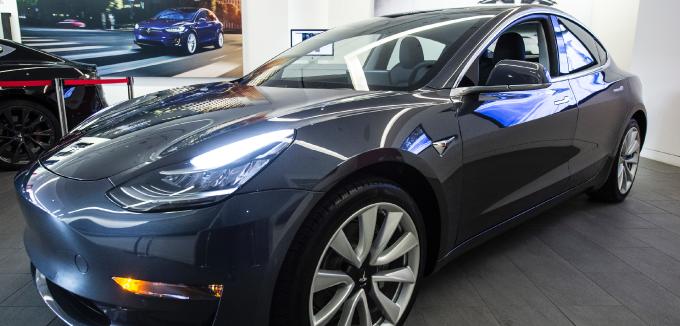Christophe Gateau / dpa
Tesla Model 3 in a showroom
Has three weeks ago Tesla-Boss Elon Musk His company actually one vigorous austerity measures including job cuts prescribed, Musk wants to reduce the production costs of the Model 3 – and so bring the promised Model 3 entry-level version for $ 35,000 on the market. Tesla does not currently offer that because every vehicle sold would incur losses.
Not so much for the saving appeal of Musk, the latest news from California seems to fit: Tesla Show stock market chart acquires battery technology specialist Maxwell Technologies for about $ 218 million announced on Monday, The acquisition pays Tesla exclusively with own shares, the business should be completed in the second quarter.
Maxwell manufactures so-called ultracapacitors that can store and quickly release energy spikes. Capacitors could serve as energy stores of the future as they can be recharged in seconds. Ready for production is their use as a larger-sized electric carBattery but far from it. The Ultracapacitors produced by Maxwell will be installed in hybrid cars and used for regenerative braking systems – not in areas that would give Tesla a technical advantage.
So, is the acquisition a risky Tesla bet at a time when the company should be saving? No, my US analysts. They praise the acquisition as a “strategically appropriate acquisition with low risk” or as “perfectly fitting”. Because Maxwell could prove to be an effective weapon for Tesla’s own battery production. The acquired energy storage specialist has developed not only super and ultra capacitors in the program, but also a so-called “dry electrode” and patented their production process.
This innovation could help Tesla make cheaper, more powerful batteries and secure Tesla’s lead in battery production. According to Maxwell, these electrodes, which are solvent-free, are expected to significantly improve the performance of lithium-ion cells while reducing cell production costs. In January, Maxwell executives told investors that they would expect strategic alliances around the new electrode technology within six months.
Dry electrodes still in the test phase
This went well with the purchase by Tesla much faster. The California electric car manufacturer has been working for years to reduce the manufacturing costs of its batteries continuously – for example, by building the huge “Gigafactory” battery factory in the Nevada desert.
So far, the lower cell cost Tesla’s competitive advantage over traditional automakers. Musk announced last week Submission of the quarterly figuresto already have the “best cost in the world” in battery production. Musk: “Our costs are lower than everyone else’s, and they are improving.”
However, they are not yet low enough to sell the basic version of the Model 3 at a profit. Whether Maxwell’s Tesla dry electrodes will actually help lower production costs in the near future is not certain. Because still they are apparently not completely ready for mass production. A global automaker and supplier are already testing the dry electrodes, Maxwell said, according to a Financial Times report. The market launch was originally planned for the year 2022. These plans could now change after the acquisition by Tesla.
Tesla enters the race for solid-state battery
Maxwell’s existing customers also have to adapt to changes. Purchasers of the supercapacitors so far included, for example, the Volvo dam Geely, the US automaker General Motors Show stock market chart, Lamborghini or the Opel-owner PSA Peugeot Citroën Show stock market chart, How far Maxwell will continue to supply them will be evident in the coming months. With the complete takeover of the German plant manufacturer Grohmann Automation, Tesla stopped orders to external customers within a few months. Grohmann concentrated under Tesla’s wings on building the production lines for Tesla’s Model 3.
However, the purchase of Maxwell also indicates that Tesla is also equipping itself for the next generation of electric car batteries: the so-called solid-state batteries, which should enable higher energy densities and faster charging times. According to industry magazines, dry electrodes are also considered an important step on the way towards solid state batteries, ultracapacitors.
The Race for the super battery of the future is already launched: Toyota has been researching for some time and wants to build such batteries in the mid-2020s in series. Volkswagen has bought the US company Quantumscape and plans a similar date for mass production. They want to anticipate the British company Dyson and the car producer Fisker. Now Tesla should also be among the teammates – even if Maxwell’s electrodes should initially provide for cheaper lithium-ion batteries.

